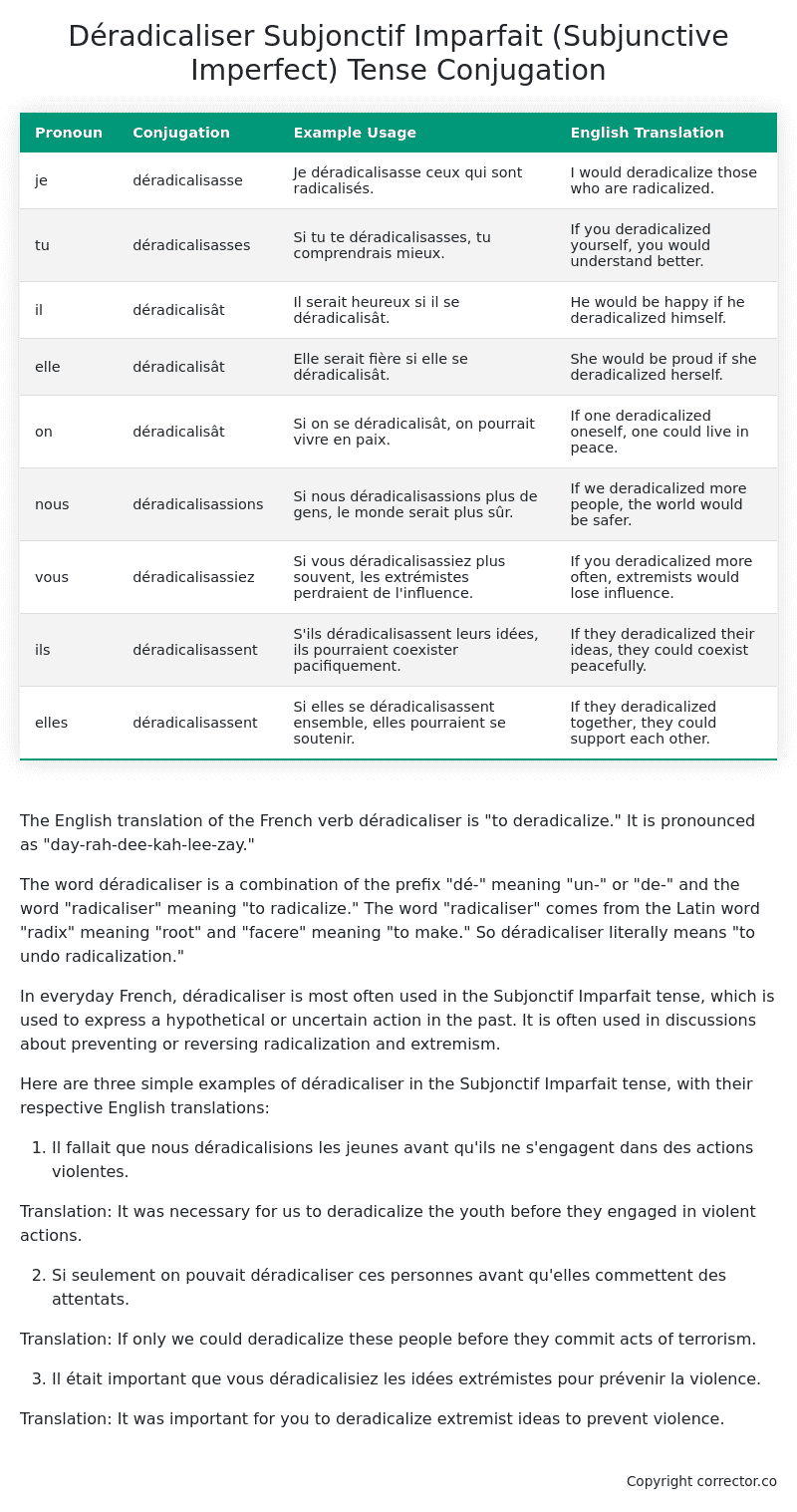Subjonctif Imparfait (Subjunctive Imperfect) Tense Conjugation of the French Verb déradicaliser
Introduction to the verb déradicaliser
The English translation of the French verb déradicaliser is “to deradicalize.” It is pronounced as “day-rah-dee-kah-lee-zay.”
The word déradicaliser is a combination of the prefix “dé-” meaning “un-” or “de-” and the word “radicaliser” meaning “to radicalize.” The word “radicaliser” comes from the Latin word “radix” meaning “root” and “facere” meaning “to make.” So déradicaliser literally means “to undo radicalization.”
In everyday French, déradicaliser is most often used in the Subjonctif Imparfait tense, which is used to express a hypothetical or uncertain action in the past. It is often used in discussions about preventing or reversing radicalization and extremism.
Here are three simple examples of déradicaliser in the Subjonctif Imparfait tense, with their respective English translations:
- Il fallait que nous déradicalisions les jeunes avant qu’ils ne s’engagent dans des actions violentes.
Translation: It was necessary for us to deradicalize the youth before they engaged in violent actions.
- Si seulement on pouvait déradicaliser ces personnes avant qu’elles commettent des attentats.
Translation: If only we could deradicalize these people before they commit acts of terrorism.
- Il était important que vous déradicalisiez les idées extrémistes pour prévenir la violence.
Translation: It was important for you to deradicalize extremist ideas to prevent violence.
Table of the Subjonctif Imparfait (Subjunctive Imperfect) Tense Conjugation of déradicaliser
| Pronoun | Conjugation | Example Usage | English Translation |
|---|---|---|---|
| je | déradicalisasse | Je déradicalisasse ceux qui sont radicalisés. | I would deradicalize those who are radicalized. |
| tu | déradicalisasses | Si tu te déradicalisasses, tu comprendrais mieux. | If you deradicalized yourself, you would understand better. |
| il | déradicalisât | Il serait heureux si il se déradicalisât. | He would be happy if he deradicalized himself. |
| elle | déradicalisât | Elle serait fière si elle se déradicalisât. | She would be proud if she deradicalized herself. |
| on | déradicalisât | Si on se déradicalisât, on pourrait vivre en paix. | If one deradicalized oneself, one could live in peace. |
| nous | déradicalisassions | Si nous déradicalisassions plus de gens, le monde serait plus sûr. | If we deradicalized more people, the world would be safer. |
| vous | déradicalisassiez | Si vous déradicalisassiez plus souvent, les extrémistes perdraient de l’influence. | If you deradicalized more often, extremists would lose influence. |
| ils | déradicalisassent | S’ils déradicalisassent leurs idées, ils pourraient coexister pacifiquement. | If they deradicalized their ideas, they could coexist peacefully. |
| elles | déradicalisassent | Si elles se déradicalisassent ensemble, elles pourraient se soutenir. | If they deradicalized together, they could support each other. |
Other Conjugations for Déradicaliser.
Le Present (Present Tense) Conjugation of the French Verb déradicaliser
Imparfait (Imperfect) Tense Conjugation of the French Verb déradicaliser
Passé Simple (Simple Past) Tense Conjugation of the French Verb déradicaliser
Passé Composé (Present Perfect) Tense Conjugation of the French Verb déradicaliser
Futur Simple (Simple Future) Tense Conjugation of the French Verb déradicaliser
Futur Proche (Near Future) Tense Conjugation of the French Verb déradicaliser
Plus-que-parfait (Pluperfect) Tense Conjugation of the French Verb déradicaliser
Passé Antérieur (Past Anterior) Tense Conjugation of the French Verb déradicaliser
Futur Antérieur (Future Anterior) Tense Conjugation of the French Verb déradicaliser
Subjonctif Présent (Subjunctive Present) Tense Conjugation of the French Verb déradicaliser
Subjonctif Passé (Subjunctive Past) Tense Conjugation of the French Verb déradicaliser
Subjonctif Imparfait (Subjunctive Imperfect) Tense Conjugation of the French Verb déradicaliser (this article)
Conditionnel Présent (Conditional Present) Tense Conjugation of the French Verb déradicaliser
Conditionnel Passé (Conditional Past) Tense Conjugation of the French Verb déradicaliser
L’impératif Présent (Imperative Present) Tense Conjugation of the French Verb déradicaliser
L’infinitif Présent (Infinitive Present) Tense Conjugation of the French Verb déradicaliser
Struggling with French verbs or the language in general? Why not use our free French Grammar Checker – no registration required!
Get a FREE Download Study Sheet of this Conjugation 🔥
Simply right click the image below, click “save image” and get your free reference for the déradicaliser Subjonctif Imparfait tense conjugation!

Déradicaliser – About the French Subjonctif Imparfait (Subjunctive Imperfect) Tense
Formation
Common Everyday Usage Patterns
Interactions with Other Tenses
Subjonctif Présent
Indicatif Passé Composé
Conditional
Conditional Perfect
Summary
I hope you enjoyed this article on the verb déradicaliser. Still in a learning mood? Check out another TOTALLY random French verb conjugation!


